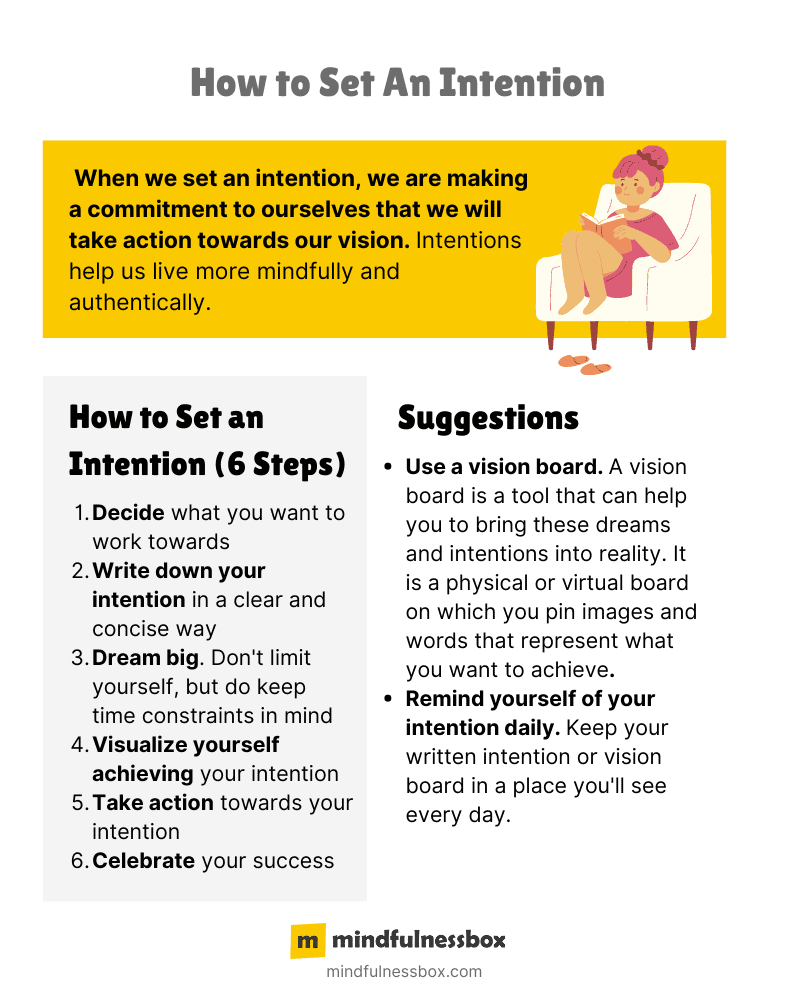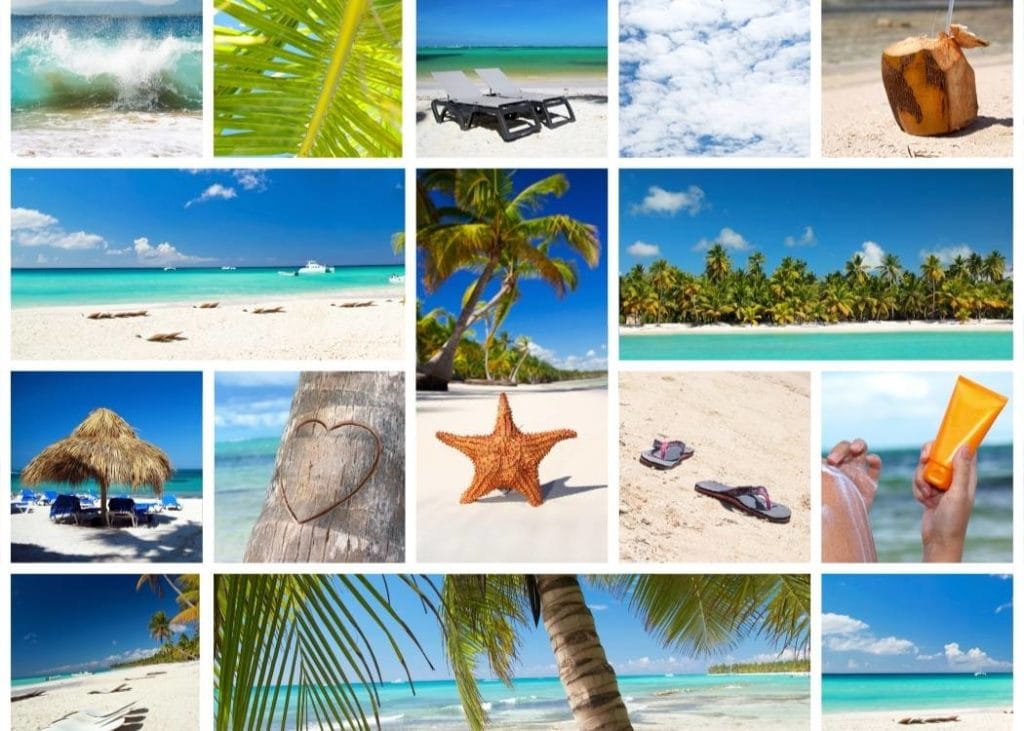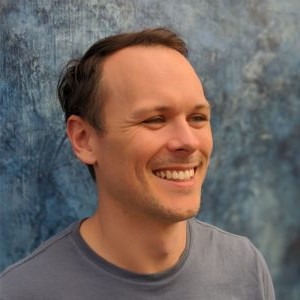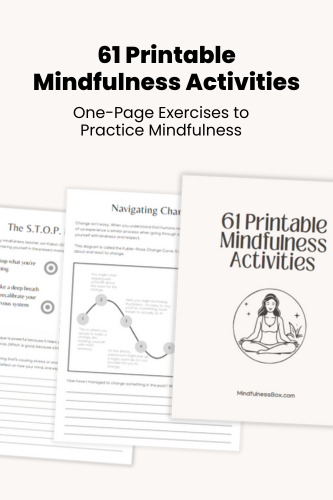Sometimes, it can feel like life is happening “to” you. By setting intentions, you may find you’re able to live more purposefully and make progress towards the life you want to live. In this article, we’ll walk through how to set intentions, how it’s different than setting a goal, and how you can use tools like vision boards to live a more mindful life.
You’ve probably heard about setting an intention. Maybe in the context of yoga, where the teacher often encourages an intention for the session. Or maybe in the context of manifestation, where intentions are used to help people reach their goals.
Intention can be set for any time frame: daily, weekly, yearly or simply as long as your current work session or yoga session lasts.
Get dozens of one-page exercises to help practice mindfulness, meditation, gratitude, and self love. Perfect for printable handouts when teaching mindfulness to groups, students, or in the workplace.
To see examples, plus a full list of the 61 exercises included, click below.
Why set an intention?
Intentions are simply a determination to do something. When we set an intention, we are making a commitment to ourselves that we will take action towards our vision. Intentions help us live more mindfully and authentically.
This has practical applications in day-to-day life.
On a short-term basis, intentions can help us decide what’s important to focus on in the course of our day. This doesn’t just mean the tasks that we do, but also the emotions we want to have while we do them.
For example, an intention I might set for myself in the morning could be: “Today my intention is to focus on writing, and I’ll approach it with lightheartedness and joy.”
Effectively, I’m giving myself a better chance of success by making my intention explicit and keeping it front of mind. If I see myself drifting away from my intention, I’m more likely to be able to bring myself back.
Over a longer time frame, intentions can help us steer our life in the direction we want to go. They give us a roadmap for our lives, and help us stay on track when things get tough.
We might envision ourselves living in a new place, with a new job or having found the partner of our dreams. Holding a vision like this can help us gravitate in the direction we want to go.
How to set intentions (6 steps)

One way to set an intention is to choose one word or phrase that represents how you want to feel that day.
For example, if your intention is “peaceful,” you might focus on breathing deeply and being more patient with others. Or if your intention is “energetic,” you might focus on taking some time for yourself in the morning to get moving.
Setting an intention for the week necessitates a little more planning. You’ll want to take time at the start of the week to think about what’s coming up, what your challenges may be, and what energy you want to bring into those challenges.
Finally, you may want to set an intention for the new year. What does your life look like at the end of the year? What intentions do you want to set in order to guide yourself there? On longer timeframes like this, tools like visioning and vision boards can help.
Here are some tips on setting an intention for the day, week or year:
- Decide what you want to work towards
- Write down your intention in a clear and concise way
- Dream big. Don’t limit yourself, but do keep time constraints in mind
- Visualize yourself achieving your intention
- Take action towards your intention
- Celebrate your success
Setting a goal vs setting an intention

The main difference between setting a goal and setting an intention is that intentions are a commitment towards a vision and a way of being, whereas goals are more granular and focused on a highly specific outcome.
When you set an intention, you are making a commitment to yourself that you will move towards your vision. Intentions help us stay focused and motivated when things get tough. They remind us of why we’re doing what we’re doing, and keep us connected to our values and purpose.
Goals are more rigid than intentions.
For example, your goal may be to get a better job this year. And to achieve that goal, you may create milestones and sub-goals. You might decide to wake up an hour early each day, and send out one resume each morning.
An intention is less about metrics, and more about the big picture.
Your intention might be “to find a job I love this year.” You might envision what it’s like at your new job– what your co-workers are like, what your daily experience is like, how it makes you feel.
You hold that intention daily, and that constant awareness helps you take action. You mention your job search to friends and neighbors, you keep it in mind as you hear about opportunities (and of course, you still send out resumes.)
Strengthen your intention with a vision board

Visioning is the practice of looking ahead to the life you want to have. This technique is often most powerful when you imagine yourself in the future, already living the life you want to live.
Creating a visioning statement can be as simple as journaling as if you were writing from the future.
Typically, it’s best to be as detailed as possible. What does your life look like a year from now? What does it feel like to be you? What emotions are you experiencing? Who are the important people in your life? Where are you living, and what does daily life look like?
A vision board is a tool that can help you to bring these dreams and intentions into reality. It is a physical or virtual board on which you pin images and words that represent what you want to achieve.
Then, you make sure to keep your vision board in a place that’s easy to see daily. When you look at your vision board, you’re reminded of what you want to move towards. This reminds you of your commitment, and helps to keep you focused and motivated.
Mindfully planning your life
With a big enough time frame, you’ll be shocked at what can happen in your life.
I’ll share a personal experience.
In 2019, I created a set of five year intentions. I saw myself living overseas, in a Spanish-speaking country, with an amazing partner, and a job I enjoyed. Three years later, I’m living that vision.
Setting intentions and creating visioning statements is a practice. That means if you’ve tried it before and haven’t had much luck sticking to it, it may be time for another try. It’s important to keep setting intentions because they put you in the driver’s seat of your own life, rather than feeling like life is happening to you.
When you’re clear about your goals and where you want to go, sometimes, everything falls into place in ways you couldn’t imagine.
Further reading
To learn more about intentions, visioning, and manifestation, see the articles below.

My mindfulness practice kicked off in 2016 with a ten-day silent retreat. Since then, I’ve read dozens of books about mindfulness and completed hundreds of hours of meditation. Thinking about what makes humans happy, calm, and peaceful is endlessly fascinating to me.


